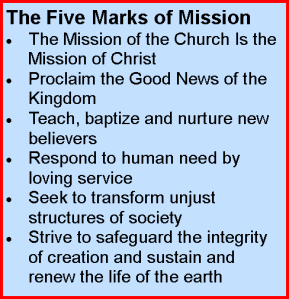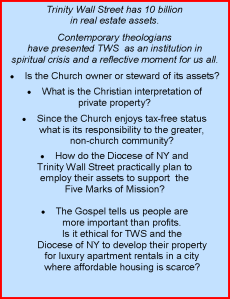The New Year blew in a month or so ago along with the Occupy movement. A tempest of blessed confusion and change, it began quietly in the sea of summer, advancing to the shore of public awareness, and gaining more momentum after the brutal international raids on Occupy communities in mid-November. Two days later, 30,000 (a low estimate) marched across the Brooklyn Bridge in joyful solidarity on a cold night. All ages, vocations, a few carrying signs that read “Screw us and we multiply.”

Now that was some candlelight vigil – Welcome Advent!
The Occupy movement brings with it provocative topics for discussion and action. A few of its principles include anti-consumerist, anti-corporate, anti-hierarchical world views. Along with these are many pros: the movement is deeply spiritual – to be close to an action and the leadership involved is to experience something akin to another Great Awakening. Those involved are dedicated in a way we have not seen for some time in America to principles of community and caring, and respect for the dignity of every human being.
It’s about occupying space, interior, exterior, positive, and negative. With occupying space comes the question “What is public property, what is private property?” You hear the call and response around the country: Whose streets? Our streets! Whose park? Our park!


If we were to ask a group attending a Sunday morning liturgy and started chanting “Whose church?” could those attending chant back as confidently as Occupiers “Our church!”? Or more accurately “God’s church!”?
That question –“Whose church?” – has been at the center of this blog since its beginning. The great divide of wealth that has been increasing over the past 30 years has been mirrored in the institutional church in terms of power and control. Control born out of fear. Economically, a few parishes hold on to their privilege while the poorer parishes start filing for the equivalent of unemployment benefits or even hospice care.
One of the things that, in my opinion, have shocked the 1% is the proud claim “We are the 99%!” They’re confused – the meme is that everyone should want to be the 1% and if you’re not there, well it’s not only your fault but you should be striving for that particular gold ring. We are expected to wait by the gate of envy, sites set on McMansions and bumper sticker colleges, producing another generation of dislocated masters of the universe. They never consider that among the 99% are those who teach the children, heal the families, clean and repair the belongings of the 1%. And the 1% can’t see the truth before them: the work of the 99% has more cultural and spiritual value and personal satisfaction than manipulating abstract false derivatives or collecting interest on inherited investments.

In my experience, the wealthier parishes are content with “church as club” served with a palate-cleansing sorbet of charity in between courses. The less wealthy – kept from understanding the freedom that accompanies poverty – are frequently wannabes. This occurred in a parish our family attended for a number of years. It was small – maybe 75 on a big festival day – but it seemed sincere and our daughter had friends in the Sunday School. Flawed as it was, it was there for a few years of her formation.
Then money got in the way. The wealthiest parishioner fell in love with the notion of labyrinths. I suppose one should give her credit that she spent her time between trips in the mini van picking up the kids reading about the history of labyrinths instead of lunching and shopping. She decided that what this tiny parish needed was a 50,000 dollar labyrinth – averaging a little over 1,000 dollars for each head attending Sunday morning.

The desire for more took the form of a capital campaign. Not one to fix the roof, get the asbestos out of the classrooms, but one that had a wish list determined by a few for the few more: a new pipe organ for the organist (a relative of the rector), an upgraded kitchen, and a columbarium. But first on the list was a fancy consultant who called in the various family heads to read us the wish list and ask us to which project we’d like to contribute. During the discussion, it was mentioned that the campaign was considered successful as 50,000 had already been raised….for a labyrinth. Needless to say, people found better things to do on Sunday morning since they had been left out of the discussion and had money targets painted on their backs.

The labyrinth still is there, private property of the church. It’s empty most of the time. There is a more rustic, community-built labyrinth three miles away by the water that is open to everyone. A few years after leaving, while on staff at an Episcopal church nearby, I suggested that the youth group walk the labyrinth. No clergy or parents knew of its existence. We tried to make an appointment. No one answered our messages. The parish web site says that those who have a divine experience while prayerfully on its path can send a letter via snail mail to the woman who donated it.
And that was a moderately middle-class parish suffering from the wannabe ethos. An ethos identical in intention with that of reality TV shows. Four miles north is a different, wealthier parish that embodies “church as club”. When the local high school performed Les Miserables (Les Comfortables present Les Miserables!) the choir director had the professionals in the choir give free private voice lessons to the high school choristers. He then purchased a booster ad in the program congratulating them as they had gotten leading roles. When the same choir director moved on, the Anglophilic search committee chose from a short list of four the one who came from the UK subsequently paying over five thousand dollars in visa fees. Let’s add to the cost of collusion in this elitist endeavor the fact that the church had to bear false witness in order to hire outside the US.

Whose culture?
What is public culture and what is private? Whose church? God’s church?
Wealthy parishes are, of course, in wealthy towns. The parishioners reflect the demographic of the area. Taxes are high; real estate in many of these areas has not been affected by the crash so far. When I say high, I mean crazy high – like the taxes on the rectory alone in our town would be the equivalent of the average American family income.
Whose building? The parish’s building. Well…the Vestry’s building for a while. But with tax exemption there ought to come some community responsibility.

Here’s a proposal and a challenge to all those who do not go to church – and there are so many of us: work for local legislation stating that a church does not receive tax exempt status unless it proves it is doing the work of the Gospel – particularly Matthew 25. And then, if the parish makes the cut and achieves tax exempt status determine what its responsibility should be to the greater community. What’s the exchange for city income deprivation? A little give-back like ensuring the church’s real estate, grounds, meeting rooms, libraries, and even worship space are open all the time. To a person of faith, all is God’s world and there is nothing secular. With real leadership and vision everything is sacrament and blessing, a banquet table to be shared by all.
Another challenge to those still attending church regularly: occupy your church. Not warm the seats on Sunday morning, or go to a few classes, or feel guilty because you missed that choral evensong, but really question who and what is “church”. Do you have a nursery school that is open just 3 hours a day and caters to the tennis mom set? How many working mothers could use affordable full-day early childhood education live surrounding your church? A lot. Stop the music style arguments. Now. Instead, ask who is singing our music, chanting our psalms. Educate upwards. I once heard a rector respond to the question “Is your new call high or low church?” that the church preferred a more relaxed style of worship, but she would be changing that as soon as she could. Whose pastor?
Are you in one of the churches on life support? Open the doors, define Christian community historically, and embrace the changes The Holy Spirit has in store for you. It will be sweet or raucous or both and indeed divine.
We cannot rely on those who have visible power in the church hierarchy to change things. They have too much self identity and comfort tangled up in the status quo. Take the recent kerfuffle over private property between Occupy Wall Street and Trinity Wall Street. The Bishop of New York and the Presiding Bishop both chose private property over people, the latter clumsily asking Occupy Wall Street to “put down their arms” – not even stepping into the ministry of wisdom – and the NYPD exercised their typically brutal response. Who was acting in holiness?
“If you consider the holiness that is God’s,
you can be sure that everyone who acts in holiness
has been begotten by him.
See what love the Father has bestowed on us
in letting us be called children of God!
Yet that is what we are.”
We are the 99% in the pews or out. Whose church? The church of the children of God!




























